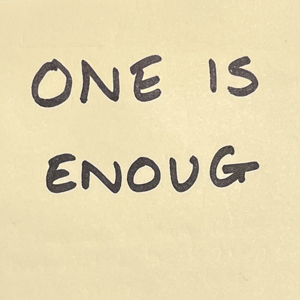 “How many participants do I need for my usability test?” is a topic that has been much discussed over the years.
“How many participants do I need for my usability test?” is a topic that has been much discussed over the years.
A thought for you: “One is enoug”.
It’s a slide that I used to show attendees at my ‘Introduction to usability testing’ tutorials back in the early 2000s. You only need one person – maybe you? – to notice that I’ve left off the letter that typically finishes the phrase.
We all know how spelling mistakes and other typographical errors can sneak into our work, and persist in it despite our most careful proof-reading and checking. Leaving the writing or content overnight can help, and getting someone else to do a review usually catches plenty more. I’ve got a poster for that: Rest it and test it
There are, of course, some things that anyone could catch (on a good day) like my missing ‘h’. Others will be completely obvious to the intended users of your work but you’ll miss them because you’re too close. I recall so many “what do they mean by [jargon term]” that only one person needed to ask. Or “why are they asking me [question]?” where we really hadn’t put enough thought into (drumroll please) why we were asking that question.
So it’s not only the minor stuff. “One is enoug” works for anything that’s a plain fact, and works even better when the participant is someone who is going to use whatever you’re working on for something real.
Do I mean “only test with one person”? Definitely not. Keep testing, and test with as rich a variety of people as you possibly can. Include disabled people. Newbies. Old people. People who use the thing on rare occasions. People who use it all the time.
“One is enoug” is about helping you to assess what you find when you test, and about choosing what you change. You can put “fix factual problem” onto your to-do list straight away. You don’t need to get anyone else to point it out to you.
Thanks to Danielle Vincent for suggesting that I write this blog post.
Thanks to Richard Nichol for spotting an ironic error: I originally wrote “like my missing ‘g'”.
